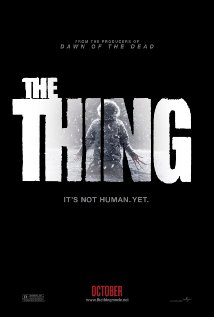
 The Thing, a remake of a remake of a solid sci-fi/horror film directed by, despite what the credits may tell you, Howard Hawks, is being projected onto silver screens in dollar theaters across the country right now. While a viewing of the movie does not immediately make clear why theater space would be made available for such a project, I strongly suspect that in the current climate of more-CGI-less-story-less-character, none of the other reels delivered to theaters contained anything more promising. In other words, for about the same reason I occasionally find myself eating broccoli. The best thing I can say for it is that there were a handful of stretches, some of them two or three minutes in duration, in which I forgot how forgettable the movie was.
The Thing, a remake of a remake of a solid sci-fi/horror film directed by, despite what the credits may tell you, Howard Hawks, is being projected onto silver screens in dollar theaters across the country right now. While a viewing of the movie does not immediately make clear why theater space would be made available for such a project, I strongly suspect that in the current climate of more-CGI-less-story-less-character, none of the other reels delivered to theaters contained anything more promising. In other words, for about the same reason I occasionally find myself eating broccoli. The best thing I can say for it is that there were a handful of stretches, some of them two or three minutes in duration, in which I forgot how forgettable the movie was.
In this third generation version, a young, good-looking scientist is asked to come to Antarctica and given no clear reason why. She is only told that it is important. When she arrives, she discovers the scientists stationed there are excavating an alien spacecraft buried in the ice a hundred thousand years ago. They have found a creature, also buried in the ice, that they believe came along with the ship. It is nothing more than a blurry form under the translucent surface, and next to nothing about it has been discovered.
They dig out a block of ice containing the extraterrestrial but, because this is sci-fi/horror, it escapes and is so unfriendly that people start dying. The rest of the movie is a desperate fight to survive in the most inhospitable environment offered on this planet that still has breathable air. For those keeping track, yes, there is a black man in this movie. No, he doesn’t make it. And that’s not a spoiler, either. As soon as I reported the monster’s escape from its prison you knew no black man was going to live long enough to read the credits.
[continue reading…]
Help Promote Prometheus Unbound by Sharing this Post
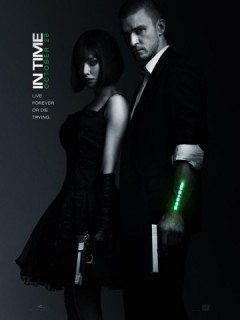
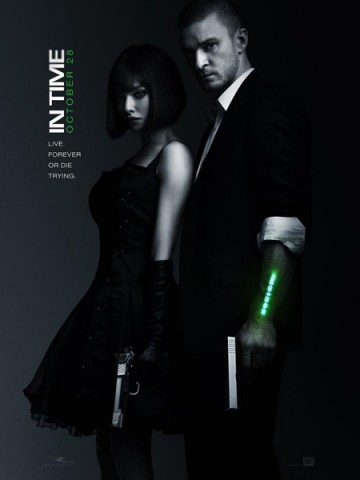
Before I studied Austrian Economics and profited from the clarity it brings to phenomena that otherwise seem chaotic and unfathomable, I read an article by Dave Barry that made me laugh. In it, he parodied the stock market, saying something to the effect of, “The DOW Jones plunged today when scientists discovered that Saturn had seven moons, and not six as previously thought.” That sentence encapsulated the mystifying and capricious vicissitudes of an economy I did not understand, much like airports stupefied the Cargo Cults. After watching In Time, it is obvious to me that writer/director/producer Andrew Niccol is mired in the same blithering ignorance that Mises and Rothbard pulled me out of.
Justin Timberlake plays Will Salas, a blue-collar man living day-to-day in a world where no one ages past 25 and time is the economy’s currency. The time you have left is measured on your forearm, and you can give and receive it either by placing your wrist over a scanner, for machine/human interactions, or gripping forearms with someone, for person-to-person transactions. The world is divided into time zones and people live in the one that pertains to their occupation and income level. As long as you have time on your forearm, you can live forever, but if you go broke, you die.
One night Will Salas saves a rich man who has wandered into Dayton, the poor time zone where Salas lives, from being robbed by so-called Minutemen, petty gangsters who steal people’s time. This man, Henry Hamilton, is 105 years old and weary of being alive. He bequeaths his century of time to Will and “times out,” but due to a surveillance camera that catches only part of the action, it looks to later observers that Will has murdered Henry. Meanwhile, on the very day her son becomes a rich man, Rachel Salas (Olivia Wilde) is caught in the middle of nowhere at night with, after making a loan payment, only ninety minutes left to live. The bus fare back home has been increased to two hours and the driver will not allow her on the bus without paying the full fare up front. None of the other passengers step forward to give her a small loan, so she is left to die. A grieving Will swears revenge on the system that killed his mother.
[continue reading…]
Help Promote Prometheus Unbound by Sharing this Post

Steven Soderbergh
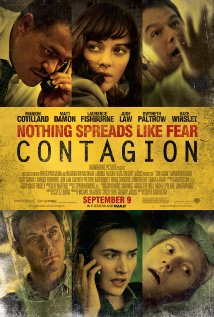 Steven Soderbergh directs a cast full of A-list Hollywood celebrities in the recently released Contagion. Playing into fears that to some extent are natural, while at the same time too often stoked of late by government fearmongers, it tells the story of a new virus that spreads quickly and wreaks havoc on the human race. Some very recognizable faces of the Hollywood elite turn splotchy and froth at the mouth.
Steven Soderbergh directs a cast full of A-list Hollywood celebrities in the recently released Contagion. Playing into fears that to some extent are natural, while at the same time too often stoked of late by government fearmongers, it tells the story of a new virus that spreads quickly and wreaks havoc on the human race. Some very recognizable faces of the Hollywood elite turn splotchy and froth at the mouth.
Comparisons will be made to Wolfgang Petersen’s Outbreak, but beyond the subject matter and big name actors, they do not much resemble one another. Contagion is either a well-researched and realistic movie about the response to a worldwide infectious disease — especially realistic at the level of government agencies like WHO and CDC — a carefully crafted fraud that makes you think it is, or a mix of the two. There are multiple storylines and it feels, at times, like a documentary. Outbreak is more fanciful and less earnest, investing little effort and less concern in realism but a good deal more in story. All things considered, I would say that Outbreak is the superior work, but Contagion is good in every aspect in which — one gets the feeling — it bothered to put in some elbow grease and is worth a viewing at the theater.
Where did it put this elbow grease? In the shots, in the blocking, in the photography, in the acting, in the editing — everywhere but the script. As one would expect from a Soderbergh film, it is well shot. Everything around the story works at a higher level than what you usually find in theaters nowadays. It has a good solid skeleton, healthy skin, strong muscles, even a brain, but it lacks a heart.
Perhaps it is a bit unfair to say that no elbow grease was spent on the script. I do not mean to give the impression that the screenwriter was incompetent. It was, as I said, either a well-researched flick or a good facsimile, either of which takes some work and skill. However, the type of story it tells, and the time it has to tell it, limit how emotionally invested we can become in the characters, which in turn limits how engrossed we can be in the action, the obstacles, and the resolution.
[continue reading…]
Help Promote Prometheus Unbound by Sharing this Post
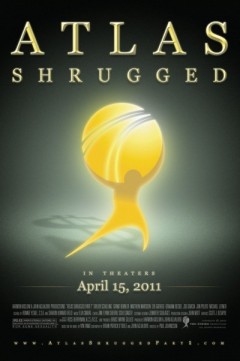
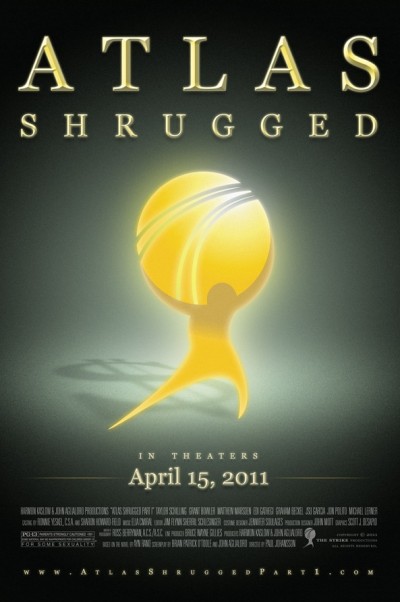 In Ayn Rand’s novel Atlas Shrugged, the first time we meet Dagny Taggart is on the Taggart Comet. The scene comes alive as Rand’s pen reveals the details such that the reader feels as if he is there. When Dagny awakens from a nap to discover the train has stopped, she gets off to investigate. Ayn Rand writes:
In Ayn Rand’s novel Atlas Shrugged, the first time we meet Dagny Taggart is on the Taggart Comet. The scene comes alive as Rand’s pen reveals the details such that the reader feels as if he is there. When Dagny awakens from a nap to discover the train has stopped, she gets off to investigate. Ayn Rand writes:
There was a cold wind outside, and an empty stretch of land under an empty sky. She heard weeds rustling in the darkness. Far ahead, she saw figures of men standing by the engine—and above them, hanging detached in the sky, the red light of a signal.
I have often thought Rand would have made an excellent director, and in that single paragraph we can see some of her talent. She appeals to three senses and evokes compelling images in our heads. A director, location scout, sound engineer, set designer, and cinematographer intent on filming such a scene have half their work done for them already. Let us hear the weeds but not see them; let us see Dagny shiver once and hold her coat tighter to her body; let us see a long shot of silhouettes of men bathed in red light from the stoplight that seems to float in the dark sky above them. The appropriate shots present themselves, practically instructing the director.
Before the stop, Dagny hears a brakeman whistling a tune she just knows was composed by Richard Halley.
“Tell me please what are you whistling?”
…
“It’s the Halley Concerto,” he answered, smiling.
“Which one?”
“The Fifth.”
She let a moment pass before she said slowly and very carefully, “Richard Halley wrote only four concertos.”
The boy’s smile vanished… “Yes, of course,” he said. “I’m wrong. I made a mistake.”
This early scene, which I find excellent and a great mood setter for the rest of the book, is absent from the movie. So too is any trace of the talent for storytelling present in it.
[continue reading…]
Help Promote Prometheus Unbound by Sharing this Post

Aaron Eckhart plays SSgt. Michael Nantz
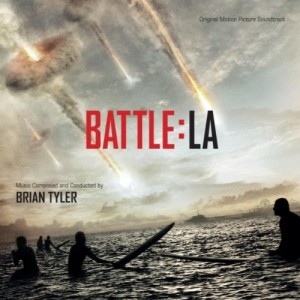
One way to determine just how predisposed one is to sci-fi is by comparing one’s opinion of Battle: Los Angeles with one’s opinion of Black Hawk Down. This opportunity is now available to theater-goers because the former movie was made by taking the old reels of the latter movie and digitally inserting aliens. This of course is not literally true (though it gives the good reader a very good idea of what to expect should he purchase tickets) so it’s not a perfect test. Black Hawk Down, as I recall, had some directorial flourishes and humorous moments that were absent from its sci-fi version, while the sci-fi version manages to pull more of a plot together amid all those bullets and explosions (indeed, I remember thinking, after Black Hawk Down, that the moviemakers had saved some money on production by bypassing the screenwriter at the cost of a missed opportunity to make a good movie). These variables aside, the two flicks are remarkably similar and one may take the test at theaters over the next handful of weeks.
For me, adding aliens to the plot, such as it is, went some way towards making the movie a more enjoyable experience. This should not be misconstrued as an endorsement for the movie with no reservations, merely a preference for one military action demo reel over another. As Shakespeare wrote, “If two men ride of a horse, one must ride behind.” If I am going to sit through about 100 minutes of violence and destruction by way of an armed forces recruitment video, there at least ought to be an alien invasion.
[continue reading…]
Help Promote Prometheus Unbound by Sharing this Post
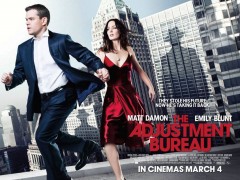
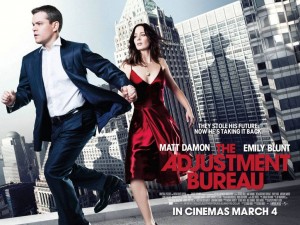
Some years ago I bought the first book of Isaac Asimov’s Foundation series, made it to approximately page 40 and tossed it aside. The writing was unimpressive, but not so bad that I would have normally opted to leave it unfinished. The problem for me was that I was not willing to suspend my disbelief so as to accept the author’s premises. I did not see the point in exploring something so patently untrue, and if his prose was going to be that insipid, with nothing especially arresting about the early part of the plot, then the opportunity cost was too high. I felt much the same as I watched The Adjustment Bureau, though I did sit through until the end.
In this film’s particular world, the human race has been guided through the centuries, off and on, by an entity referred to as The Chairman who has in his employ a number of beings, human in appearance, with extraordinary powers. The Chairman took the human race from barbaric tribalism to the height of the Roman Empire before deciding to allow us to make our decisions for ourselves. What followed were the Dark Ages, so this benevolent dictator assumed control once more and guided us through the Renaissance and the Enlightenment up to about 1910, whereupon we were given one more chance to be free. We produced WWI, The Great Depression, WWII and brought the world to the brink of nuclear holocaust, so we lost our freedom yet again, presumably for good this time.
[continue reading…]
Help Promote Prometheus Unbound by Sharing this Post
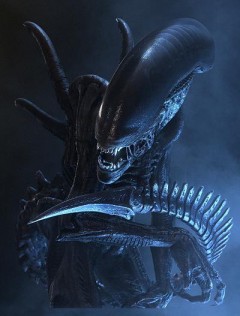
This time, it’s war.
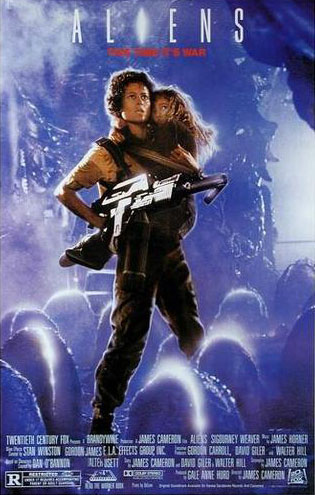
It is possible, however unlikely, that I could shuffle a deck of cards, lay them face down on a table and, in dealing to you the top five, deliver a royal flush. If I dealt to 649,740 people, the odds are good that at least one of them would get poker’s strongest hand, but to the one who actually got it, it would seem almost miraculous, more than he deserved. The cinematic equivalent of a royal flush is what the Alien trilogy received as first a young Ridley Scott, then a young James Cameron, and finally a young David Fincher were chosen to direct its films (some are occasionally moved to insist that there were four Alien movies. I must ask the good reader to accept my assurance that there was no fourth film; any lingering memories of such a thing are probably due to a bad dream).
By all rights, Aliens should have been unremarkable. Following a classic with a classic is next to impossible. Francis Ford Coppola did it, but he followed his own work and brought his same style and vision back to the tale. Aliens would be directed by a Canadian — a near-American! — who was going off a British film that had revolutionized a genre. Although the first installment left unanswered questions, it was not fashioned in such a way that a sequel naturally sprang from its story. For more on what such a situation is likely to produce, the reader may watch the sequels to Psycho and Jaws. If he wishes to explore the top end of the Bell Curve of this particular demographic, he should check out 2010 (The Empire Strikes Back might conceivably be added, but Lucas was still intimately involved with that project and, at any rate, in this reviewer’s humble yet obdurate opinion, Episode V is decidedly inferior to Episode IV).
[continue reading…]
Help Promote Prometheus Unbound by Sharing this Post
 The Thing, a remake of a remake of a solid sci-fi/horror film directed by, despite what the credits may tell you, Howard Hawks, is being projected onto silver screens in dollar theaters across the country right now. While a viewing of the movie does not immediately make clear why theater space would be made available for such a project, I strongly suspect that in the current climate of more-CGI-less-story-less-character, none of the other reels delivered to theaters contained anything more promising. In other words, for about the same reason I occasionally find myself eating broccoli. The best thing I can say for it is that there were a handful of stretches, some of them two or three minutes in duration, in which I forgot how forgettable the movie was.
The Thing, a remake of a remake of a solid sci-fi/horror film directed by, despite what the credits may tell you, Howard Hawks, is being projected onto silver screens in dollar theaters across the country right now. While a viewing of the movie does not immediately make clear why theater space would be made available for such a project, I strongly suspect that in the current climate of more-CGI-less-story-less-character, none of the other reels delivered to theaters contained anything more promising. In other words, for about the same reason I occasionally find myself eating broccoli. The best thing I can say for it is that there were a handful of stretches, some of them two or three minutes in duration, in which I forgot how forgettable the movie was.



 Steven Soderbergh
Steven Soderbergh














